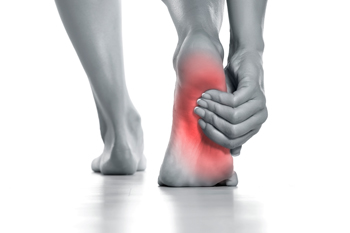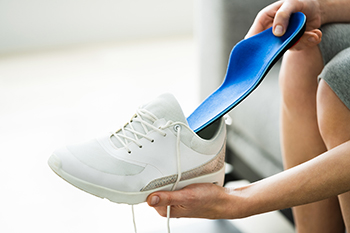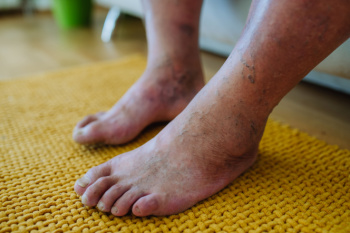Connect With Us
Blog
Items filtered by date: June 2024
Foot and Ankle Injuries in Young People Who Play Sports
 Foot and ankle injuries are common among kids and adolescents who play sports, ranging from congenital variants to acute and chronic injuries. Congenital variants can include structural abnormalities present at birth. Osteochondroses, a group of disorders affecting the growth of bones in children and adolescents, can cause pain and swelling. Acute injuries, such as fractures and sprains, and chronic injuries, like stress fractures and tendonitis, are prevalent due to the repetitive stress of sports activities. Soft tissue injuries, including strains and ligament tears, are also frequent. Additionally, infections can complicate injuries if not properly treated. Podiatrists must consider systemic diseases such as inflammatory arthritis when a pediatric athlete presents with unexplained pain and swelling in one or more joints. Adolescents tend to sustain more injuries than younger children due to their increased participation in high-intensity sports and the physical changes during growth spurts. If your child has sustained a foot or ankle injury from playing sports or complains of associated pain, it is suggested that you schedule an appointment with a podiatrist for a proper diagnosis and treatment.
Foot and ankle injuries are common among kids and adolescents who play sports, ranging from congenital variants to acute and chronic injuries. Congenital variants can include structural abnormalities present at birth. Osteochondroses, a group of disorders affecting the growth of bones in children and adolescents, can cause pain and swelling. Acute injuries, such as fractures and sprains, and chronic injuries, like stress fractures and tendonitis, are prevalent due to the repetitive stress of sports activities. Soft tissue injuries, including strains and ligament tears, are also frequent. Additionally, infections can complicate injuries if not properly treated. Podiatrists must consider systemic diseases such as inflammatory arthritis when a pediatric athlete presents with unexplained pain and swelling in one or more joints. Adolescents tend to sustain more injuries than younger children due to their increased participation in high-intensity sports and the physical changes during growth spurts. If your child has sustained a foot or ankle injury from playing sports or complains of associated pain, it is suggested that you schedule an appointment with a podiatrist for a proper diagnosis and treatment.
Sports related foot and ankle injuries require proper treatment before players can go back to their regular routines. For more information, contact Dr. Eddy Caldwell of Foot Care of Northeast Arkansas, P.A.. Our doctor can provide the care you need to keep you pain-free and on your feet.
Sports Related Foot and Ankle Injuries
Foot and ankle injuries are a common occurrence when it comes to athletes of any sport. While many athletes dismiss the initial aches and pains, the truth is that ignoring potential foot and ankle injuries can lead to serious problems. As athletes continue to place pressure and strain the area further, a mild injury can turn into something as serious as a rupture and may lead to a permanent disability. There are many factors that contribute to sports related foot and ankle injuries, which include failure to warm up properly, not providing support or wearing bad footwear. Common injuries and conditions athletes face, including:
- Plantar Fasciitis
- Plantar Fasciosis
- Achilles Tendinitis
- Achilles Tendon Rupture
- Ankle Sprains
Sports related injuries are commonly treated using the RICE method. This includes rest, applying ice to the injured area, compression and elevating the ankle. More serious sprains and injuries may require surgery, which could include arthroscopic and reconstructive surgery. Rehabilitation and therapy may also be required in order to get any recovering athlete to become fully functional again. Any unusual aches and pains an athlete sustains must be evaluated by a licensed, reputable medical professional.
If you have any questions please feel free to contact our office located in Jonesboro, AR . We offer the newest diagnostic and treatment technologies for all your foot and ankle needs.
Custom Orthotics Seasonal - Any Season

Rain or shine, snow or sleet, Custom Orthotics have your feet covered! As the seasons change, ensure your steps remain comfortable and supported. Custom Orthotics adapt to your footwear, from summer sandals to winter boots, providing consistent relief and alignment. Don't let the changing weather dictate your foot comfort. Step confidently year-round and experience the difference with Custom Orthotics. Call today for more information.
Causes of Pain on the Bottom of the Foot

Pain on the bottom of the foot can arise from various conditions, impacting daily activities and overall well-being. Plantar fasciitis is characterized by inflammation of the plantar fascia, a thick band of tissue connecting the heel to the toes. This condition often results in stabbing pain near the heel, especially in the morning. Another cause is metatarsalgia, where the ball of the foot becomes inflamed, leading to pain and discomfort during walking or running. Neuromas, particularly Morton’s neuroma, involve nerve inflammation between the toes, causing sharp, burning pain. Flat feet or fallen arches can lead to overpronation, straining the foot muscles and ligaments. Overuse injuries from excessive physical activity, wearing improper footwear, and obesity also contribute to bottom of the foot pain. Conditions like arthritis or diabetic neuropathy can worsen discomfort. Identifying the specific cause of foot pain is vital for effective treatment and maintaining foot health, ensuring mobility and comfort. If you have pain in this part of your foot, it is strongly suggested that you consult a podiatrist who can determine the cause and offer appropriate treatment solutions.
Foot Pain
Foot pain can be extremely painful and debilitating. If you have a foot pain, consult with Dr. Eddy Caldwell from Foot Care of Northeast Arkansas, P.A.. Our doctor will assess your condition and provide you with quality foot and ankle treatment.
Causes
Foot pain is a very broad condition that could be caused by one or more ailments. The most common include:
- Bunions
- Hammertoes
- Plantar Fasciitis
- Bone Spurs
- Corns
- Tarsal Tunnel Syndrome
- Ingrown Toenails
- Arthritis (such as Gout, Rheumatoid, and Osteoarthritis)
- Flat Feet
- Injury (from stress fractures, broken toe, foot, ankle, Achilles tendon ruptures, and sprains)
- And more
Diagnosis
To figure out the cause of foot pain, podiatrists utilize several different methods. This can range from simple visual inspections and sensation tests to X-rays and MRI scans. Prior medical history, family medical history, and any recent physical traumatic events will all be taken into consideration for a proper diagnosis.
Treatment
Treatment depends upon the cause of the foot pain. Whether it is resting, staying off the foot, or having surgery; podiatrists have a number of treatment options available for foot pain.
If you have any questions, please feel free to contact our office located in Jonesboro, AR . We offer the newest diagnostic and treatment technologies for all your foot care needs.
When to Consider Custom Foot Orthotics

Recognizing the signs that warrant the use of custom foot orthotics can be instrumental in alleviating discomfort and promoting optimal foot health. Persistent foot pain, especially after prolonged standing or physical activity, may signal the need for orthotic support. Likewise, recurring instances of heel pain, arch discomfort, or ankle instability could indicate underlying biomechanical issues that orthotics can address. Individuals experiencing foot or muscle fatigue may also benefit from the cushioning and support provided by orthotics. Common conditions treated by foot orthotics include plantar fasciitis, flat feet, high arches, bunions, and Achilles tendonitis, among others. By addressing these symptoms and conditions, orthotics can help improve alignment, reduce pressure points, and enhance overall comfort during daily activities. If you are considering wearing custom-made orthotics that can provide relief for your foot condition, it is suggested that you speak with a podiatrist for an evaluation.
If you are experiencing discomfort in your feet and would like to try custom orthotics, contact Dr. Eddy Caldwell from Foot Care of Northeast Arkansas, P.A.. Our doctor can provide the care you need to keep you pain-free and on your feet.
What Are Custom Orthotics?
Custom orthotics are inserts you can place into your shoes to help with a variety of foot problems such as flat feet or foot pain. Orthotics provide relief and comfort for minor foot and heel pain.
Over-the-Counter Inserts
Shoe inserts come in a wide variety and are used to treat foot pain, heel pain, and minor problems. For example, arch supports can be inserted into your shoes to help correct overarched or flat feet, while gel insoles are often used because they provide comfort and relief from foot and heel pain by alleviating pressure.
Prescription Orthotics
If over-the-counter inserts don’t work for you or if you have a more severe foot concern, it is possible to have your podiatrist prescribe custom orthotics. These high-quality, custom inserts are designed to treat problems such as abnormal motion, plantar fasciitis, and severe forms of heel pain. They can even be used to help patients suffering from diabetes by treating foot ulcers and painful calluses and are usually molded to your feet individually, which allows them to provide full support and comfort.
If you're experiencing minor to severe foot or heel pain, it’s recommended to speak with your podiatrist about the possibility of using custom orthotics or shoe inserts. A podiatrist can determine which type of custom orthotic or shoe insert is right for you and help you take the first steps toward being pain-free.
If you have any questions please contact our office located in Jonesboro, AR . We offer the newest diagnostic and treatment technologies for all your foot and ankle needs.
It's Time for Beautiful Feet
Types of Neuropathy and Its Impact on Feet

Peripheral neuropathy is a condition caused by damage to the peripheral nerves, often resulting in numbness, tingling, burning sensations, and pain in the extremities. There are several types of peripheral neuropathy, each with its own set of causes and symptoms. Regardless of the underlying cause, peripheral neuropathy can have a significant impact on the feet, leading to decreased sensation, balance issues, and an increased risk of foot injuries and ulcers. Diabetic neuropathy is one of the most common types and is caused by nerve damage from prolonged exposure to high blood sugar levels in people with diabetes. Other types include compressive neuropathy, which occurs when nerves are compressed or pinched, and toxic neuropathy, which can result from exposure to certain medications, chemicals, or toxins. Proper foot care, including regular inspections, supportive footwear, and maintaining good blood sugar levels for diabetes, is essential for managing symptoms and preventing complications associated with peripheral neuropathy. If your feet are affected with any of the above symptoms, it is strongly suggested that you meet with a podiatrist who can offer you effective methods to manage the type of neuropathy you have.
Neuropathy
Neuropathy can be a potentially serious condition, especially if it is left undiagnosed. If you have any concerns that you may be experiencing nerve loss in your feet, consult with Dr. Eddy Caldwell from Foot Care of Northeast Arkansas, P.A.. Our doctor will assess your condition and provide you with quality foot and ankle treatment for neuropathy.
What Is Neuropathy?
Neuropathy is a condition that leads to damage to the nerves in the body. Peripheral neuropathy, or neuropathy that affects your peripheral nervous system, usually occurs in the feet. Neuropathy can be triggered by a number of different causes. Such causes include diabetes, infections, cancers, disorders, and toxic substances.
Symptoms of Neuropathy Include:
- Numbness
- Sensation loss
- Prickling and tingling sensations
- Throbbing, freezing, burning pains
- Muscle weakness
Those with diabetes are at serious risk due to being unable to feel an ulcer on their feet. Diabetics usually also suffer from poor blood circulation. This can lead to the wound not healing, infections occurring, and the limb may have to be amputated.
Treatment
To treat neuropathy in the foot, podiatrists will first diagnose the cause of the neuropathy. Figuring out the underlying cause of the neuropathy will allow the podiatrist to prescribe the best treatment, whether it be caused by diabetes, toxic substance exposure, infection, etc. If the nerve has not died, then it’s possible that sensation may be able to return to the foot.
Pain medication may be issued for pain. Electrical nerve stimulation can be used to stimulate nerves. If the neuropathy is caused from pressure on the nerves, then surgery may be necessary.
If you have any questions, please feel free to contact our office located in Jonesboro, AR . We offer the newest diagnostic and treatment technologies for all your foot care needs.
Why Diabetic Patients Experience Foot Problems
 Diabetic patients often experience foot problems due to poor blood circulation and nerve damage, or neuropathy, caused by prolonged high blood sugar levels. Reduced blood flow can lead to slow healing of cuts and sores, while neuropathy can cause numbness, tingling, or a loss of sensation in the feet. This combination increases the risk of developing ulcers and infections, and injuries may go unnoticed. Diabetic foot symptoms include swelling, redness, warmth, and pain. Some individuals may feel a burning or sharp pain, while others might experience complete numbness. Foot deformities like hammertoes or Charcot foot can also develop causing discomfort and instability. To manage these issues, diabetic patients should maintain proper blood sugar levels, perform daily foot inspections, wear appropriate footwear, and practice good foot hygiene. Regular check-ups with a podiatrist are essential. If you have diabetes, it is strongly suggested that you seek comprehensive care from this type of doctor, who can perform regular foot evaluations and offer preventive measures tailored to diabetic needs.
Diabetic patients often experience foot problems due to poor blood circulation and nerve damage, or neuropathy, caused by prolonged high blood sugar levels. Reduced blood flow can lead to slow healing of cuts and sores, while neuropathy can cause numbness, tingling, or a loss of sensation in the feet. This combination increases the risk of developing ulcers and infections, and injuries may go unnoticed. Diabetic foot symptoms include swelling, redness, warmth, and pain. Some individuals may feel a burning or sharp pain, while others might experience complete numbness. Foot deformities like hammertoes or Charcot foot can also develop causing discomfort and instability. To manage these issues, diabetic patients should maintain proper blood sugar levels, perform daily foot inspections, wear appropriate footwear, and practice good foot hygiene. Regular check-ups with a podiatrist are essential. If you have diabetes, it is strongly suggested that you seek comprehensive care from this type of doctor, who can perform regular foot evaluations and offer preventive measures tailored to diabetic needs.
Diabetic foot care is important in preventing foot ailments such as ulcers. If you are suffering from diabetes or have any other concerns about your feet, contact Dr. Eddy Caldwell from Foot Care of Northeast Arkansas, P.A.. Our doctor can provide the care you need to keep you pain-free and on your feet.
Diabetic Foot Care
Diabetes affects millions of people every year. The condition can damage blood vessels in many parts of the body, especially the feet. Because of this, taking care of your feet is essential if you have diabetes, and having a podiatrist help monitor your foot health is highly recommended.
The Importance of Caring for Your Feet
- Routinely inspect your feet for bruises or sores.
- Wear socks that fit your feet comfortably.
- Wear comfortable shoes that provide adequate support.
Patients with diabetes should have their doctor monitor their blood levels, as blood sugar levels play such a huge role in diabetic care. Monitoring these levels on a regular basis is highly advised.
It is always best to inform your healthcare professional of any concerns you may have regarding your feet, especially for diabetic patients. Early treatment and routine foot examinations are keys to maintaining proper health, especially because severe complications can arise if proper treatment is not applied.
If you have any questions please feel free to contact our office located in Jonesboro, AR . We offer the newest diagnostic and treatment technologies for all your foot and ankle needs.






